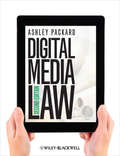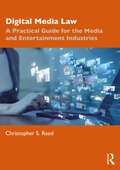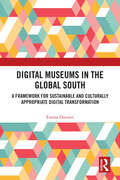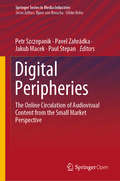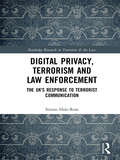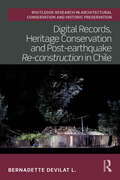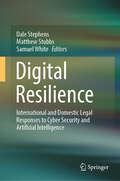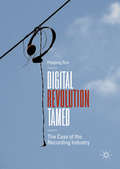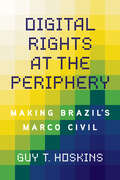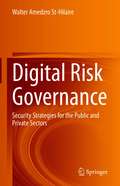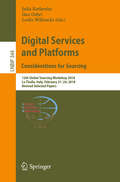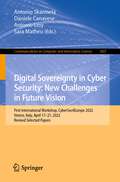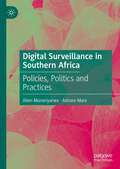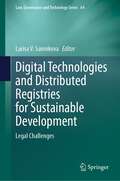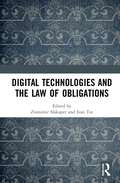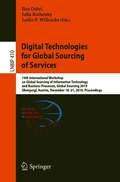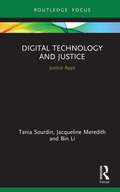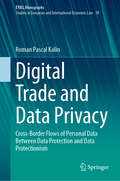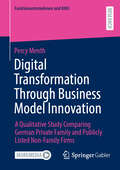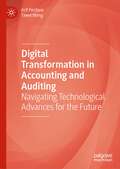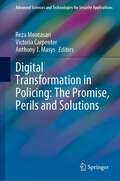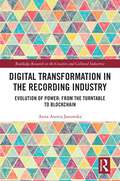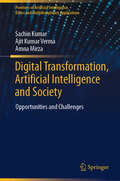- Table View
- List View
Digital Media Law
by Ashley PackardCovering the latest legal updates and rulings, the second edition of Digital Media Law presents a comprehensive introduction to all the critical issues surrounding media law. Provides a solid foundation in media lawIllustrates how digitization and globalization are constantly shifting the legal landscapeUtilizes current and relevant examples to illustrate key conceptsRevised section on legal research covers how and where to find the lawUpdated with new rulings relating to corporate political speech, student speech, indecency and Net neutrality, restrictions on libel tourism, cases filed against U.S. information providers, WikiLeaks and shield laws, file sharing, privacy issues, sexting, cyber-stalking, and many othersAn accompanying website is regularly updated with new rulings, access to slip opinions and other supplementary material.
Digital Media Law: A Practical Guide for the Media and Entertainment Industries
by Christopher S. ReedDigital Media Law offers a practical guide to the law of media and communication, focusing on digital channels, models, and technologies. It draws together the aspects of media law that are most critical for those engaged in the production and distribution of digital media, from traditional broadcasters and internet-based services to major internet platforms. As an expert scholar and educator in media law, Christopher S. Reed brings considerable experience as an in-house lawyer for a U.S.-based media company with extensive news, sports, and entertainment operations. This blend of practical and scholarly insight delivers a textbook which packs foundational principles and concepts into the context of the digital environment, focusing on how those doctrines are applied in the face of rapidly evolving newsgathering, production, and distribution technologies. Key features include: "In the News" sections that tie the legal principles to real-world events or situations An integrated fictional case study of a media enterprise Insights into digital media policy. This accessible textbook is the ideal companion for advanced undergraduate and graduate students as well as practitioners interested in law, journalism, and media studies.
Digital Museums in the Global South: A Framework for Sustainable and Culturally Appropriate Digital Transformation
by Emma DuesterThis book focuses on digital museums in the context of Vietnam and contributes to global discussions on the development of digital museum offerings needed to meet audience demands, requirements for sustainable digitisation methods for cultural heritage, demands for the development of intellectual property protection for the digital environment, and shows ways for national governments to support digital museums.Duester provides insight into museums in part of the Global South, where infrastructure funding and technical and human resource constraints impact the take-up and display of digital content. With on-the-ground research from three Vietnamese museums, Duester argues for a museum framework that is sustainable, ethical, and culturally appropriate. The Vietnamese government’s strategy for digitalisation of culture, heritage, and museums is assessed, and the book includes a list of recommendations on sustainable digitisation methods, intellectual property protection measures for the digital environment, management, phygital business models, and new digital revenue streams.The volume will benefit scholars involved in the cultural and creative industries, as well as museum professionals and cultural policymakers who will value the book’s assessment of international standards, treaties, and conventions on copyright law and how they apply to museums, as well as the recommendations listed above.
Digital Peripheries: The Online Circulation of Audiovisual Content from the Small Market Perspective (Springer Series in Media Industries)
by Petr Szczepanik Pavel Zahrádka Jakub Macek Paul StepanThis is an open access book. Media industry research and EU policymaking are predominantly tailored to large (and, in the latter case, Western) European markets. This open access book addresses the specific qualities of smaller media markets, highlighting their vulnerability to global digital competition and outlining survival strategies for them. New online distribution models and new trends in the consumption of audiovisual content are limited by, and pose new challenges for, existing audiovisual business models and their legal framework in the EU. The European Commission’s Digital Single Market (DSM) strategy, which was intended e.g. to remove obstacles to the cross-border distribution of audiovisual content, has triggered a heated debate on the transformation of the existing ecosystem for European screen industries. While most current discussions focus on the United States, Western Europe, and the multinational giants, this book approaches these industry trends and policy questions from the perspective of relatively small and peripheral (in terms of their population, language, cross-border cultural flows, and financial and/or symbolic capital) media markets.
Digital Pirates: Policing Intellectual Property in Brazil
by Alexander Sebastian DentDigital Pirates examines the unauthorized creation, distribution, and consumption of movies and music in Brazil. Alexander Sebastian Dent offers a new definition of piracy as indispensable to current capitalism alongside increasing global enforcement of intellectual property (IP). Complex and capricious laws might prohibit it, but piracy remains a core activity of the twenty-first century. Combining the tools of linguistic and cultural anthropology with models from media studies and political economy, Digital Pirates reveals how the dynamics of IP and piracy serve as strategies for managing the gaps between texts—in this case, digital content. Dent's analysis includes his fieldwork in and around São Paulo with pirates, musicians, filmmakers, police, salesmen, technicians, policymakers, politicians, activists, and consumers. Rather than argue for rigid positions, he suggests that Brazilians are pulled in multiple directions according to the injunctions of international governance, localized pleasure, magical consumption, and economic efficiency. Through its novel theorization of "digital textuality," this book offers crucial insights into the qualities of today's mediascape as well as the particularized political and cultural norms that govern it. The book also shows how twenty-first century capitalism generates piracy and its enforcement simultaneously, while producing fraught consumer experiences in Latin America and beyond.
Digital Privacy, Terrorism and Law Enforcement: The UK's Response to Terrorist Communication (Routledge Research in Terrorism and the Law)
by Simon Hale-RossThis book examines the UK’s response to terrorist communication. Its principle question asks, has individual privacy and collective security been successfully managed and balanced? The author begins by assessing several technologically-based problems facing British law enforcement agencies, including use of the Internet; the existence of ‘darknet’; untraceable Internet telephone calls and messages; smart encrypted device direct messaging applications; and commercially available encryption software. These problems are then related to the traceability and typecasting of potential terrorists, showing that law enforcement agencies are searching for needles in the ever-expanding haystacks. To this end, the book examines the bulk powers of digital surveillance introduced by the Investigatory Powers Act 2016. The book then moves on to assess whether these new powers and the new legislative safeguards introduced are compatible with international human rights standards. The author creates a ‘digital rights criterion’ from which to challenge the bulk surveillance powers against human rights norms. Lord Carlile of Berriew CBE QC in recommending this book notes this particular legal advancement, commenting that rightly so the author concludes the UK has fairly balanced individual privacy with collective security. The book further analyses the potential impact on intelligence exchange between the EU and the UK, following Brexit. Using the US as a case study, the book shows that UK laws must remain within the ambit of EU law and the Court of Justice of the European Union's (CJEU's) jurisprudence, to maintain the effectiveness of the exchange. It addresses the topics with regard to terrorism and counterterrorism methods and will be of interest to researchers, academics, professionals, and students researching counterterrorism and digital electronic communications, international human rights, data protection, and international intelligence exchange.
Digital Records, Heritage Conservation and Post-earthquake Re-construction in Chile (Routledge Research in Architectural Conservation and Historic Preservation)
by Bernadette Devilat L.The conservation of built heritage implies constant intervention. One form of intervention is reconstruction, which, in the context of disasters, usually tries to bring buildings and places back to their previous state and is contested in heritage discourses. This book challenges reconstruction as a replica to physically preserve damaged built heritage by critically examining a context of constant change resulting from earthquakes – Chile – advocating for the digital record to be an analytical basis for design, following the principles embedded in historical domestic architecture.Beyond monumental heritage, the focus is on the living heritage of the historical settlements of Tarapacá, Zúñiga, and Lolol, built with local resources and sustainable techniques. The book proposes re-construction as an alternative methodology, based on 3D-laser-scanning, photography, and questionnaires, to analyse the as-built condition of earthquake-affected buildings, consider risk mitigation, and recognise adaptation to earthquakes and subsequent reconstructions. This is relevant for seismic-prone areas and built heritage at risk in general.This book is aimed at researchers, academics, and practitioners in architectural conservation and is also a valuable resource for authorities and stakeholders involved in post-earthquake scenarios.
Digital Resilience: International and Domestic Legal Responses to Cyber Security and Artificial Intelligence
by Dale Stephens Matthew Stubbs Samuel WhiteThis book arises from a cybersecurity conference at the University of Adelaide attended by a group of government and academic experts. It presents the possible responses Australia can take to deter and respond to cybersecurity threats. It also examines the legal responsibility for cyber security and artificial intelligence, asking who (if anyone) bears responsibility for the myriad legal issues that arise. This book presents an authoritative legal framework for understanding the liability and responsibility of actors involved in cyberspace and the use of artificial intelligence. Providing an overarching summary of cybersecurity and artificial intelligence threats, followed by detailed analysis of potential authorizations and limitations regulating policy and governance responses, this book canvases a wide spectrum of civil and criminal frameworks. It is comprehensive enough to be useful for a wide cross-section of the Australian society in a range of sectors: individual users, small businesses, tertiary institutions, large corporations, and government. It is also beneficial to military personnel in outlining the legal frameworks available in times of armed conflict.
Digital Revolution Tamed: The Case of the Recording Industry
by Hyojung SunThis book explores why widespread predictions of the radical transformation in the recording industry did not materialise. Although the growing revenue generated from streaming signals the recovery of the digital music business, it is important to ask to what extent is the current development a response to digital innovation. Hyojung Sun finds the answer in the detailed innovation process that has taken place since Napster. She reassesses the way digital music technologies were encultured in complex music valorisation processes and demonstrates how the industry has become reintermediated rather than disintermediated. This book offers a new understanding of digital disruption in the recording industry. It captures the complexity of the innovation processes that brought about technological development, which arose as a result of interaction across the circuit of the recording business – production, distribution, valorisation, and consumption. By offering a more sophisticated account than the prevailing dichotomy, the book exposes deterministic myths surrounding the radical transformation of the industry.
Digital Rights at the Periphery: Making Brazil's Marco Civil (Geopolitics of Information)
by Guy T. HoskinsSigned into law in 2014, the Marco Civil da Internet (Brazilian Civil Rights Framework for the Internet) appeared to offer pioneering legislation for a digital bill of rights that addressed issues like network neutrality and privacy. Guy T. Hoskins chronicles the Marco Civil’s development and its failure to confront the greatest concentration of power in the digital age: informational capitalism. Combining interviews with discourse and political-economic analysis, Hoskins reveals why the legislation fell short while examining the implications of its emergence in Brazil, which remains on the margins of the global system of informational capitalism. Hoskins places collectivist and public service principles at the core of any framework’s effectiveness. He also shows why we must create systems sensitive to the sociocultural and political-economic contexts that will shape digital rights and their usefulness. Compelling and contrarian, Digital Rights at the Periphery looks at communications policy and internet governance in the Global South and the lessons they provide for the rest of the world.
Digital Risk Governance: Security Strategies for the Public and Private Sectors
by Walter Amedzro St-HilaireThis book discusses digital risk governance in a global context and provides practical solutions for sound digital policy. From cyber-attacks to the mechanisms of digital technical management on a global scale, this book identifies the fundamental areas of digital vulnerability for both states and businesses and outlines the means of securing them. Written with the digital security needs of the public and private sectors in mind, chapters provide approachable guidance on navigating national digital strategies for public and corporate cyber-risks, identifying mechanisms for embedding digital security over time, protecting both personal and strategic economic data, adapting regulations to digital challenges, and leveraging innovation and multilateralism for digital security. Providing a comprehensive view of digital risk mechanisms for multiple stakeholders, this volume will be useful for professionals and practitioners in technology governance, digital management, IS/risk management, digital security, and internet policy.
Digital Services and Platforms. Considerations for Sourcing: 12th Global Sourcing Workshop 2018, La Thuile, Italy, February 21–24, 2018, Revised Selected Papers (Lecture Notes in Business Information Processing #344)
by Julia Kotlarsky Ilan Oshri Leslie WillcocksThis book constitutes revised selected papers from the 12th international Global Sourcing Workshop 2018, held in La Thuile, Italy, in February 2018. The 9 contributions included were carefully reviewed and selected from 40 submissions. The book offers a review of the key topics in sourcing of services, populated with practical frameworks that serve as a tool kit to students and managers. The range of topics covered in this book is wide and diverse, offering micro and macro perspectives on successful sourcing of services. Case studies from various organizations, industries and countries are used extensively throughout the book, giving it a unique position within the current literature offering.
Digital Sovereignty in Cyber Security: First International Workshop, CyberSec4Europe 2022, Venice, Italy, April 17–21, 2022, Revised Selected Papers (Communications in Computer and Information Science #1807)
by Antonio Skarmeta Antonio Lioy Daniele Canavese Sara MatheuThis book constitutes papers presented during the workshop session titled “CyberSec4Europe - Research to Innovation: Common Research Framework on Security and Privacy” during the Privacy Symposium hosted by Università Ca’ Foscari in Venice, Italy, in April 2022. The 11 peer-reviewed selected papers present findings, conclusions, research, and recommendations in various security-related areas, from highly technical ones (e.g., software and network security) to law and human-centric ones (e.g., governance and cybersecurity awareness).
Digital Surveillance in Southern Africa: Policies, Politics and Practices
by Admire Mare Allen MunoriyarwaThis book critically examines the manifest and latent practices of surveillance in the southern African region, using case studies from South Africa, Zimbabwe, Zambia, Namibia, Botswana and Mozambique. The book demonstrates the growing role of super-powers in the construction and normalization of the surveillance state. It traces the digitization of surveillance practices to the rapid adoption of smart CCTV, facial recognition technologies and EMSI catchers. Through predictive policing mechanisms, state security agencies have appropriated digital media technologies for sentiment analysis, constant monitoring of digital footprints of security targets, and even deploying cyber-troops on popular social media platforms. The authors argue that surveillance practices have thus been digitized with deleterious impact on the right to privacy, peaceful assembly and freedom of expression in the region. Furthermore, they argue that specific laws and regulations governing surveillance practices in the region are lagging behind. Finally, the book demonstrates how digital surveillance have significantly infiltrated the political, economic and social fabric of Southern Africa. This book provides much needed systematic, cutting-edge research into the trends, practices, policies and geo-political interests at the center of surveillance practices in the region, providing a crucial link between human rights, such as freedom of privacy and expression, and political authoritarianism.
Digital Technologies and Distributed Registries for Sustainable Development: Legal Challenges (Law, Governance and Technology Series #64)
by Larisa V. SannikovaDigital technologies are playing a growing role in achieving the UN’s Sustainable Development Goals (SDGs). They are both a tool both for achieving developmental outcomes and a driver of change. However, the use of digital technologies also entails certain legal challenges. The purpose of this book is to highlight these challenges and suggest solutions. Written by leading researchers from six countries, who analyse legislative solutions from around the world, it includes chapters on the benefits of asset tokenisation, the role of artificial intelligence in achieving sustainable development, legal issues in the green digital transformation, and human rights in a digital world. Through a mixture of fundamental analysis and real-world examples, readers will learn how emerging digital technologies can help achieve various SDGs and what legal challenges arise from their application. This important resource will be of interest to academics, government and legal officials whose work involves the legal regulation of the introduction and use of new digital technologies, as well as sustainable development challenges. Legal experts engaged in the design of new legal infrastructures during the current phase of digital, climatic and social transformation in private, public and social organizations will also find it useful.
Digital Technologies and the Law of Obligations
by Zvonimir Slakoper Ivan TotDigital Technologies and the Law of Obligations critically examines the emergence of new digital technologies and the challenges they pose to the traditional law of obligations, and discusses the extent to which existing contract and tort law rules and doctrines are equipped to meet these new challenges. This book covers various contract and tort law issues raised by emerging technologies – including distributed ledger technology, blockchain-based smart contracts, and artificial intelligence – as well as by the evolution of the internet into a participative web fuelled by user-generated content, and by the rise of the modern-day collaborative economy facilitated by digital technologies. Chapters address these topics from the perspective of both the common law and the civil law tradition. While mostly focused on the current state of affairs and recent debates and initiatives within the European Union regulatory framework, contributors also discuss the central themes from the perspective of the national law of obligations, examining the adaptability of existing legal doctrines to contemporary challenges, addressing the occasional legislative attempts to deal with the private law aspects of these challenges, and pointing to issues where legislative interventions would be most welcomed. Case studies are drawn from the United States, Singapore, and other parts of the common law world. Digital Technologies and the Law of Obligations will be of interest to legal scholars and researchers in the fields of contract law, tort law, and digital law, as well as to legal practitioners and members of law reform bodies.
Digital Technologies for Global Sourcing of Services: 14th International Workshop on Global Sourcing of Information Technology and Business Processes, Global Sourcing 2019, Obergurgl, Austria, December 18–21, 2019, Proceedings (Lecture Notes in Business Information Processing #410)
by Julia Kotlarsky Ilan Oshri Leslie P. WillcocksThis book constitutes revised selected papers from the 14th International Global Sourcing Workshop 2019, held in Obergurgl, Austria, in December 2019. The 10 contributions included were carefully reviewed and selected from a total of 36 submissions.The book offers a review of the key topics in sourcing of services, populated with practical frameworks that serve as a tool kit to students and managers. The range of topics covered in this book is wide and diverse, offering various perspectives on the employment of digital technologies in the context of sourcing services. More specifically the book examines sourcing decisions and management practices around digital platforms, robotic process automation and blockchain, giving specific attention to digital aspects of innovation in sourcing.
Digital Technology and Justice: Justice Apps
by Bin Li Tania Sourdin Jacqueline MeredithJustice apps – mobile and web-based programmes that can assist individuals with legal tasks – are being produced, improved, and accessed at an unprecedented rate. These technologies have the potential to reshape the justice system, improve access to justice, and demystify legal institutions. Using artificial intelligence techniques, apps can even facilitate the resolution of common legal disputes. However, these opportunities must be assessed in light of the many challenges associated with app use in the justice sector. These include the digital divide and other accessibility issues; the ethical challenges raised by the dehumanisation of legal processes; and various privacy, security, and confidentiality risks. Surveying the landscape of this emergent industry, this book explores the objectives, opportunities, and challenges presented by apps across all areas of the justice sector. Detailed consideration is also given to the use of justice apps in specific legal contexts, including the family law and criminal law sectors. The first book to engage with justice apps, this book will appeal to a wide range of legal scholars, students, practitioners, and policy-makers.
Digital Trade and Data Privacy: Cross-border Flows of Personal Data Between Data Protection and Data Protectionism (European Yearbook of International Economic Law #38)
by Roman Pascal KalinThis monograph provides a comprehensive examination of the intricate legal challenges arising at the intersection of digital trade and data privacy. It argues in favour of an integrated approach to understanding the dynamic interaction between digital trade and data privacy, with the aim of building a bridge between these two fields of law. Cross-border data flows are paramount for the operational efficiency and productivity of companies across diverse industries. The ongoing economic transformation, characterized by the perception of data as both a commodity and currency, exacerbates the tension between the push for economic liberalization of cross-border transfers of personal data under a trade rationale and the limitations imposed on such transfers for non-economic reasons. Given that the regulation of cross-border personal data transfers is profoundly influenced by both international trade law and national data privacy laws, a complex relationship has developed between the normative values that underpin these legal frameworks. This publication centers on the resulting interdependence of digital trade and data privacy in a global digital economy. It provides a contribution to the debate on a (re)contextualisation of trade law against the background of the advent of digital trade.
Digital Transformation Through Business Model Innovation: A Qualitative Study Comparing German Private Family and Publicly Listed Non-Family Firms (Familienunternehmen und KMU)
by Percy MenthAssumed a variance between the established paths and opportunities occurring from the new, digital technologies, the aim of this book is to better understand why firms can struggle on digital transformation through business model innovation. In depth, Percy Menth studies, what specific characteristics of German private family firms and publicly listed non-family firms can influence potential struggling. Furthermore, the aim of this book is to identify ways, how both could benefit from one another. Therefore, the author analyses interviews with 30 owners and C-level managers from 30 German private family firms and 20 C-level managers of 15 German publicly listed non-family firms facing digital transformations. This study’s key finding is, that it is not the firms’ nature, that may primarily foster digital transformation and business model innovation, but rather people, who could make the difference between struggling and success.
Digital Transformation in Accounting and Auditing: Navigating Technological Advances for the Future
by Arif Perdana Tawei WangThis book elucidates the digital transformation of accounting by examining the countless challenges academic institutions encounter in the wake of technological progress. This underscores the importance of accountants in enhancing their skill set to align with today’s evolving digital landscape. The text evaluates cutting-edge technologies, such as artificial intelligence, data analytics, and blockchain, exploring their impact on accounting decision-making processes. Through a comprehensive analysis of the intersection between these technologies and diverse industrial sectors, this book illuminates the distinctive challenges and possibilities. The book provides an essential reference for professionals and scholars seeking a thorough understanding of accounting domain in the digital age.
Digital Transformation in Policing: The Promise, Perils and Solutions (Advanced Sciences and Technologies for Security Applications)
by Anthony J. Masys Reza Montasari Victoria CarpenterThis book shares essential insights into how the social sciences and technology could foster new advances in managing the complexity inherent to the criminal and digital policing landscape. Said landscape is both dynamic and intricate, emanating as it does from crimes that are both persistent and transnational. Globalization, human and drug trafficking, cybercrime, terrorism, and other forms of transnational crime can have significant impacts on societies around the world. This necessitates a reassessment of what crime, national security and policing mean. Recent global events such as human and drug trafficking, the COVID-19 pandemic, violent protests, cyber threats and terrorist activities underscore the vulnerabilities of our current security and digital policing posture.This book presents concepts, theories and digital policing applications, offering a comprehensive analysis of current and emerging trends in digital policing. Pursuing an evidence-based approach, it offers an extraordinarily perceptive and detailed view of issues and solutions regarding the crime and digital policing landscape. To this end, it highlights current technological and methodological solutions as well as advances concerning integrated computational and analytical solutions deployed in digital policing. It also provides a comprehensive analysis of the technical, ethical, legal, privacy and civil liberty challenges stemming from the aforementioned advances in the field of digital policing; and accordingly, offers detailed recommendations supporting the design and implementation of best practices including technical, ethical and legal approaches when conducting digital policing. The research gathered here fits well into the larger body of work on various aspects of AI, cybersecurity, national security, digital forensics, cyberterrorism, ethics, human rights, cybercrime and law. It provides a valuable reference for law enforcement, policymakers, cybersecurity experts, digital forensic practitioners, researchers, graduates and advanced undergraduates, and other stakeholders with an interest in counter-terrorism. In addition to this target audience, it offers a valuable tool for lawyers, criminologist and technology enthusiasts.
Digital Transformation in The Recording Industry: Evolution of Power: From The Turntable To Blockchain (Routledge Research in the Creative and Cultural Industries)
by Anna Anetta JanowskaThe recording industry has famously been transformed by technology throughout its entire history.The book presents an analysis of these changes using Porter's five forces model. The author highlights the evolution of buyers' and suppliers' power, the emergence of new competitors, product innovation and rivalry between companies in the industry driven by economic, political, social and legal factors.As an early mover in the social diffusion of copyright-sensitive content, the recording industry reflected in this book serves as an important reference for the analysis of other cultural and creative sectors.
Digital Transformation in the Recording Industry: Evolution of Power: From The Turntable To Blockchain (Routledge Research in the Creative and Cultural Industries)
by Anna Anetta JanowskaThe recording industry has famously been transformed by technology throughout its entire history. The book presents an analysis of these changes using Porter's five forces model. The author highlights the evolution of buyers' and suppliers' power, the emergence of new competitors, product innovation and rivalry between companies in the industry driven by economic, political, social and legal factors. As an early mover in the social diffusion of copyright-sensitive content, the recording industry reflected in this book serves as an important reference for the analysis of other cultural and creative sectors.
Digital Transformation, Artificial Intelligence and Society: Opportunities and Challenges (Frontiers of Artificial Intelligence, Ethics and Multidisciplinary Applications)
by Ajit Kumar Verma Sachin Kumar Amna MirzaThis book examines the fundamental concepts and principles of digital transformation and AI, including their historical development, and underlying technologies, and analyzes the opportunities arising from digital transformation and AI in different sectors, such as healthcare, finance, education, transportation, and governance. It provides a comprehensive overview of digital transformation and AI technologies and their current state of implementation. It also explores the potential challenges and risks associated with digital transformation and AI, including ethical considerations, job displacement, privacy concerns, biases, impact on inequality, social interactions, and the overall well-being of individuals and communities. Additionally, the books provides and discusses policy and regulatory frameworks that can effectively address the opportunities and challenges posed by digital transformation and AI leading to responsible AI. It also delves into impact of automation on the job market and workforce. The book concludes by proposing potential strategies for navigating opportunities and challenges of digital transformation and AI integration. It emphasizes the need for interdisciplinary collaboration among stakeholders, including policymakers, industry leaders, academia, and civil society, to develop a comprehensive approach towards harnessing the full potential of digital transformation and AI and associated technologies. The book employs a multidisciplinary approach, drawing from various fields such as computer science, sociology, philosophy, political science, economics, law and governance. It combines theoretical analysis, empirical case studies, and expert perspectives to provide a holistic view of the subject matter. This book caters to a diverse audience, including students, researchers, academics, policymakers, industry professionals, and technology enthusiasts. It provides a valuable resource for those seeking a comprehensive understanding ofthe opportunities and challenges arising from the integration of digital transformation and AI in society.
